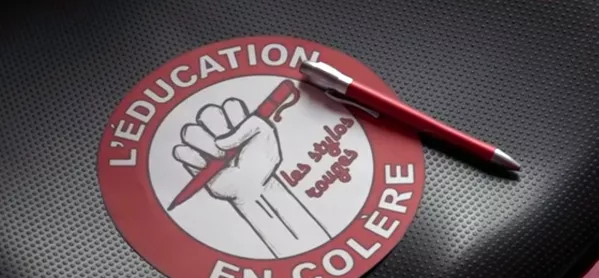When I am looking at news articles in the French press, I am often intrigued by their borrowings from English. A piece I read recently revealed that teachers in modern French schools were suffering from overwork and “le burn out”. You know that suffering is serious when perfectly serviceable French words for exhaustion are no longer adequate.
The list of complaints from French teachers mirrors almost exactly that of school staff in England: poor pay, heavy workload, job cuts, lack of resources, the relatively low status of the profession and government reforms are major bugbears. Unions are working to improve things, but, campaigners say, nothing ever seems to change. It’s as if the angry voices of real teachers are yet to be heard.
So it was perhaps no surprise then that a new protest movement is emerging from French classrooms: inspired by the success of the gilets jaunes (yellow vests) protests in forcing concessions from government, thousands of teachers are now signing up to become part of the stylos rouges (red pens). Nothing says “angry” better than a red pen, after all. A clear manifesto points out the movement’s demands and news organisations are already churning out excited stories.
Launched in early December, a Facebook group at the heart of the movement already has nearly 59,000 members, and numbers are climbing every hour. Locals groups are popping up across the country and planning action: in Lille, for example, teachers arriving back after the Christmas holidays gave all their students’ work full marks, no matter how bad it was. Pickets of local education offices have been planned and teachers will refuse to mark exam papers.
The stylos rouges say they are not politically affiliated and are not standing in opposition to established unions. They want to work alongside them and help them have a greater impact with ministers, they say.
Experts in France stress that many teachers now feel distanced from traditional structures and feel more empowered by social media-led movements without political affiliation.
Campaign branding, clearly, is key. Like the yellow vests, the stylos rouges have a distinct symbol that anyone can understand - even website editors keen to continue their coverage of the revolution.
Teachers in England should be inspired by the French teachers’ pluck in riding the revolutionary wave, however successful they turn out to be.
While many feel too busy to eat lunch let alone start a revolution, it is possible for teachers to step out of line and make their voices heard.
The Tes person of the year, headteacher Jules White, proved that a little organisation can go a long way. When 2,000 headteachers marched on Downing Street protesting against school cuts the issue was propelled into the national headlines.
But we need to see more of this. Teachers shouldn’t wait for permission to speak out. The online tools are there for anyone to use and all they need is a decent symbol to rally around.
But what might that be? The “interactive whiteboards” or the “academic year planners” as protest group names don’t really evoke much of the underlying anger in the profession.
Perhaps it’s time for us to borrow from the French, and set up Les Stylos Rouges, UK branch.
Irena Barker previously taught English language in French secondary schools and at Limoges University




